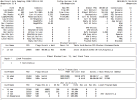Hi to all.
I am studying VST Tables.
I am interested on table _Lock
I need to know every possible values i can have in fields :
_Lock._Lock-flags.
I found this useful article http://knowledgebase.progress.com/articles/Article/21639 that explain how this field is set in PROMON Utility..
How can i test with 4GL ????
I.E I want to display only Shared Locks ...
FOR EACH _Lock NO-LOCK:
IF _Lock._Lock-Flags = "S"
THEN
DISP
_Lock._Lock-Id
_Lock._Lock-Usr
_Lock._Lock-Name
_Lock._Lock-Table
_Lock._Lock-flags.
END.
Thanks to all ...
I am studying VST Tables.
I am interested on table _Lock
I need to know every possible values i can have in fields :
_Lock._Lock-flags.
I found this useful article http://knowledgebase.progress.com/articles/Article/21639 that explain how this field is set in PROMON Utility..
How can i test with 4GL ????
I.E I want to display only Shared Locks ...
FOR EACH _Lock NO-LOCK:
IF _Lock._Lock-Flags = "S"
THEN
DISP
_Lock._Lock-Id
_Lock._Lock-Usr
_Lock._Lock-Name
_Lock._Lock-Table
_Lock._Lock-flags.
END.
Thanks to all ...

